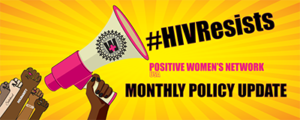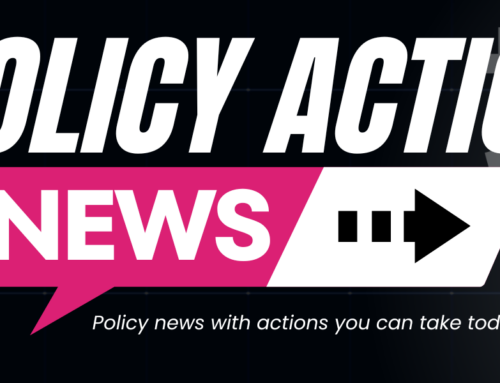
Want updates like this one directly in your inbox? Subscribe for emails from PWN here!
Content Warning: many of these updates include information about harmful attacks on Black, Indigenous and people of color (BIPOC) and LGBTQ+ folx.
🔥 Hot Topic: The Intertwined Fight for Trans Rights & Reproductive Justice 🔥
Abortions bans and bans on gender-affirming care are inextricably linked.
This is true on a fundamental level. Both bans restrict peoples’ bodily autonomy. They disregard the fundamental principle that people should be able to control what does and does not happen to our bodies; to determine our own path in life. Reproductive justice cannot be fully realized until people have the right to parent their children in safe and healthy environments. Gender-affirming care bans, which typically restrict care for people under eighteen, make this impossible. It has been proven time and time again that gender-affirming care saves lives. Gender-affirming care bans, on the other hand, have deadly consequences for trans youth.
The linkages don’t end there. Both bans impose legal penalties on providers for administering evidence-based, dignified healthcare. Both bans disproportionately impact people in the South, whose access to healthcare is likely already burdened by malicious policies or healthcare deserts. Both bans force people and families to cross state lines in search of essential, lifesaving care (assuming they can afford to travel, which many people and families cannot). A recent study revealed more than 170,000 people have traveled out of state to receive abortion care since January 2023. Similarly, the 39% of trans youth who live in states with gender-affirming care bans could have to drive up to 20 hours, round trip, to receive care.
Furthermore, in every state where there is a total abortion ban, lawmakers have introduced and in some cases passed various types of gender-affirming care bans. Some lawmakers have responded to these coordinated attacks with coordinated protections, often dubbed “shield” laws. Though the scope of the laws varies state by state, shield laws 1) legally protect patients’ ability to receive care in their state, and 2) protect both providers and patients from punishment.
There is no reproductive justice without trans liberation, and vice versa. At their core, gender-affirming care bans and abortion bans are both attempts to criminalize healthcare and control peoples’ bodies. These already intertwined struggles can and should also be linked to HIV criminalization, and to the growing effort to criminalize wearing masks in public. De-siloing these movement spaces and working together against all carceral approaches to public health is the best and most strategic path towards bodily autonomy for everyone, everywhere, always.

LGBTQ+ Health, Rights, and Justice
- In April, the Biden administration finalized Section 1557, which strengthened nondiscrimination protections in healthcare for several marginalized groups, including sexual orientation and gender identity (SOGI). This month, the Texas and Montana Attorneys General have sued the Biden administration to get the protections repealed. Additionally, a federal judge has blocked the enforcement of another anti-discrimination rule, protecting against SOGI discrimination in schools and education programs, in Kentucky, Indiana, Ohio, Tennessee, Virginia, and West Virginia.
- A Florida federal judge has permanently blocked SB 254, a Florida law which: banned all gender-affirming care for minors, created restrictions on healthcare for trans adults, and imposed other restrictions on medical care for people of trans experience.
- In the states surrounding Colorado, the ACLU is tracking a combined 110 anti-LGBTQIA+ bills. No such laws have been introduced or passed in Colorado, making it a safe harbor, particularly for people of trans experience.
Access to Healthcare
- More than half of all people living with HIV in the United States are older than 50. However, United States healthcare infrastructure is unprepared to meet the needs of older people living with HIV due to funding constraints, holes in the social safety net, untrained providers, and workforce shortages.
- Project 2025, which outlines conservatives’ plan should they regain control of the White House, proposes lifetime Medicaid caps that would strip benefits from low-income populations. People living in states that have not expanded Medicaid would be especially vulnerable.
- A federal court has handed down a decision in the case Braidwood v. Becerra, where a coalition of small businesses in Texas objected to the ACA requirement that they cover PrEP in their employee health plans. The Court sided with the coalition, but only with respect to the businesses who brought the suit. The case is expected to be appealed up to the Supreme Court.

Reproductive Health, Rights, and Justice
- The United States Supreme Court has dismissed a case that challenged the FDA’s approval of mifepristone. For now, providers can still legally provide the drug online. However, the case was decided on standing, meaning that further challenges could potentially be successful.
- The Supreme Court reinstated a lower court ruling to temporarily allow emergency abortion care in Idaho under the Emergency Medical Treatment and Active Labor Act (EMTALA), the longstanding federal law that ensures access to emergency care. The Court could have, but did not, clearly state that EMTALA’s protections override state abortion bans. While this case makes its way through the courts, pregnant Idahoans will once again have protection for emergency abortion care under EMTALA. This is a critical reprieve, but it is also temporary and limited.

- The Texas Supreme Court has declined to review a Denton County case that could have upended access to in vitro fertilization treatment across the state.
- More than half of the 800,000 women living under parole and probation reside in states with abortion restrictions. This makes the path to abortion access difficult, and, in some cases, impossible.
Economic Justice
- The United States Supreme Court has handed down a decision in Starbucks v. McKinney, holding that Starbucks validly fired seven employees in 2022, while their store was in the midst of unionizing. The workers brought the suit on the theory that they had been fired in retaliation for their organizing activities.
- The Affordable Connectivity Program, which brings affordable internet to more than 23 million households, is unlikely to be renewed. However, these alternatives remain.
- The Louisiana Department of Children and Family Services has started administering SUN benefits, a USDA-funded program meant to help families feed children while school is out. Check your eligibility here.

Ending Criminalization
- The United States Supreme Court is expected to rule this month on whether local governments can criminalize sleeping in public spaces. This decision will significantly impact the way smaller jurisdictions address the current housing crisis.
- The Biden administration has implemented a policy blocking the path to asylum for most migrants crossing the U.S.-Mexico border without papers. The ACLU is suing the administration for failing to properly follow regulatory procedure.
- In Philadelphia, Kensington’s police presence has nearly tripled with police who have recently graduated from the academy. The new officers will increase foot patrols to enhance enforcement of harmful laws that criminalize people who use drugs.
- Around the United States, policymakers in both progressive and conservative jurisdictions are bringing back “tough-on-crime” measures, reminiscent of those instituted in the 1990s. This wave of laws comes at a time when the crime rate nears record lows.




